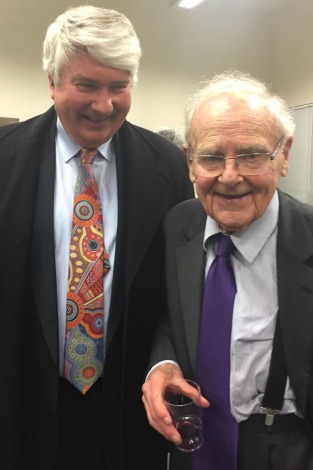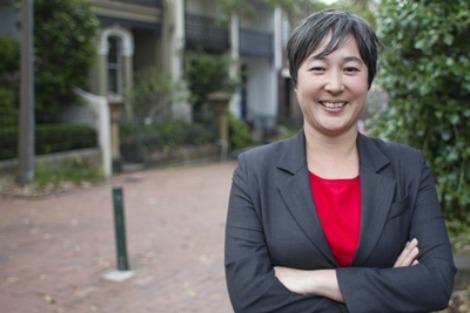Keywords: Democratic Labor Party
-

INTERNATIONAL
- Jeff Sparrow
- 09 June 2017
17 Comments
When Corbyn invoked the many against the few, he did so while advocating free education, the renationalisation of utilities and a break from the US alliance. By contrast, Blair coined the phrase in a speech where he urged listeners to put behind them 'the bitter political struggles of left and right that have torn our country apart for too many decades. Many of these conflicts have no relevance whatsoever to the modern world - public versus private, bosses versus workers, middle class versus working class.' We all know which version sits closer to Shorten's heart.
READ MORE 
-

AUSTRALIA
- Frank Brennan
- 31 May 2017
6 Comments
Indigenous leaders this last week have called for the creation of two new legal entities. They want a First Nations Voice enshrined in the Constitution, and a Makarrata Commission set up by legislation. The Makarrata Commission would supervise agreement making between governments and First Nations and engage in truth telling about history. The envisaged destination is a national Makarrata (or treaty). So the immediate constitutional issue is the creation of the First Nations Voice. There is no point in proceeding with a referendum on a question which fails to win the approval of Indigenous Australia. Neither is there any point in proceeding with a referendum which is unlikely to win the approval of the voting public.
READ MORE
-

RELIGION
- Frank Brennan
- 17 February 2017
3 Comments
The commission's forensic scrutiny of past actions of church officials in no way constitutes an interference with the freedom of religion. Its spotlight is to be welcomed, provided only that it is shone on a truly representative sample of all institutions which have been found wanting and provided the same light filter is applied to all institutions. I do however have a problem with the commission making findings on issues like the want of compassion when those findings are made only against a Church.
READ MORE
-

AUSTRALIA
- Frank Brennan
- 31 October 2016
3 Comments
'First warning: if you're going to be serious about a Human Rights Act, make sure that your government departments are sufficiently resourced and encouraged to produce meaningful statements of compatibility. Second warning, especially in a unicameral legislature: make sure that your parliamentary committee on human rights has sufficient muscle and status to arrest the progress of any bill until it has been thoroughly scrutinised for human rights compliance.' Frank Brennan's remarks at the Fringe Conference of the 2016 Queensland ALP Convention.
READ MORE
-

AUSTRALIA
- Frank Brennan
- 28 October 2016
7 Comments
Even prior to Brexit, the Conservatives were wanting to replace the UK Human Rights Act with weaker legislation. They have been worried about what they perceive to be a loss of sovereignty. But even the British Conservatives remain committed to some form of human rights act. I commend the Queensland parliament for undertaking its present inquiry, and sound a cautious note of optimism about the modest gains which might be made by the enactment of a human rights act in Australia.
READ MORE 
-

AUSTRALIA
- Fatima Measham
- 16 October 2016
12 Comments
Much has been made about how Republicans benefited from the 'birther' campaign and the Tea Party. It suited them to have proxies undermine the executive branch. In other words, the political right only has itself to blame for the nihilism which now engulfs it - and potentially, the nation. But the failures of the left also bear examination. While Clinton's current lead cannot be attributed entirely to her virtues, the polling gap between her and Trump should have been much wider, earlier.
READ MORE 
-

INTERNATIONAL
- Frank Brennan
- 26 July 2016
3 Comments
John traces the political ascent and descent of Sturzo whose first public office was as mayor of his own town. The chapter headings mark each step up and down the Everest of Italy's experiment with democracy and fascism: the emergence of political Catholicism in Italy; the dream takes shape; democracy without direction; democracy in decline; the search for a leader; the stick and the carrot; the voice of the watchman; and enter the night. Sturzo goes into exile; Mussolini takes over; and the Vatican is well pleased because the Roman Question is finally resolved in 1929 with the Lateran Treaties negotiated by Mussolini and Pope Pius XI, each of whom got what they were looking for.
READ MORE
-

AUSTRALIA
- Jarni Blakkarly
- 21 June 2016
11 Comments
Across the political spectrum, Australia's major and minor parties are failing to reflect the multicultural Australia of the 21st century. We have fallen far behind similar nations like Canada, who elected 19 Indian-Canadians alone, and ten indigenous parliamentarians, at their last election. Who we elect to our parliament is not just about the gesture, it is also a reflection of where power lies within our society, and whose voices are given the space to be heard to represent the community.
READ MORE 
-

AUSTRALIA
- Frank Brennan
- 30 May 2016
5 Comments
'Being in the middle of an election campaign, I will not be making any partisan party political points. However being here in the bellwether seat of Eden-Monaro, I will conclude with a critique of both major political parties, and with one piece of political advice for citizens of goodwill seeking a national asylum policy more in harmony with the ideals set out by our bishops in their social justice statement.' Yass Catholic Parish Potluck Dinner, 28 May 2016
READ MORE
-

AUSTRALIA
'We have now got a world wide refugee problem. We don't have one here but we do have one world wide. It is now time to start having a rational debate about what we do with these people as opposed to playing the race card.' Interview with Anna Burke, who has represented the seat of Chisholm in the House of Representatives for the ALP since 1998. Burke is the former Speaker of the House (2012–2013), and has been a consistent advocate for asylum seekers. She will retire at the next election.
READ MORE 
-

AUSTRALIA
- Justin Glyn
- 20 April 2016
9 Comments
Last week, a member of Parliament, Jenny Leong, allegedly faced racist and sexist abuse by police from at least four separate commands. This abuse was linked to her opposition (in accordance with her party's stated policy) to the use of drug sniffer dogs without a search warrant. Whether or not one agrees with Green party policy in this regard, the treatment of Leong ought to rankle. Such ill-treatment at the hands of the executive is, unfortunately, not an isolated phenomenon.
READ MORE 
-

AUSTRALIA
- John Warhurst
- 01 March 2016
11 Comments
The government, the Greens, and Senator Nick Xenophon want to keep the debate about electoral justice as narrow as possible because they are offering some technical improvements. But they shouldn't be allowed to rush their reforms, which must be separated from the idea of a double dissolution election driven by a determination to cut short the terms of sitting micro-party senators. The anti-major party feeling among a significant minority of voters cannot just be condemned as mere populism.
READ MORE 